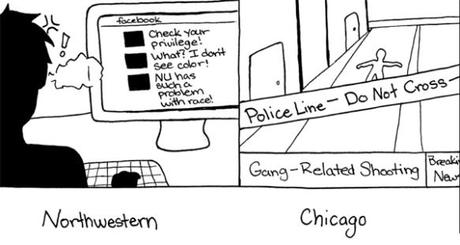One way you know you’ve won an argument about social justice is when your opponent says something like, “YEAH WELL you don’t see people in the Third World whining about their preferred pronouns/racist Halloween costumes/the use of the word ‘retard’!”
There is a pervasive idea out there that people in the Third World only have Big Terrible Problems like poverty and genocide, and people in industrialized countries only have Stupid Silly Problems like getting toilet paper stuck on the bottom of their shoe or having to wait in traffic or whatever. There are, apparently, no problems between those two extremes in severity, and no problems are worth talking about besides the Big Terrible Problems.
“I wonder how many people identify as genderqueer in Somalia,” one Tumblr user declaimed. “Oh, wait. I forgot. Those people have actual problems.” Another made a list of “social justice issues that are extremely important” and “social justice issues that Tumblr users think are extremely important.” The former list contained poverty, human trafficking, human rights violations, and genocide. The latter contained white privilege, cultural appropriation, and gender pronouns.
A particularly egregious example of this was a recent cartoon in the Daily Northwestern, which was published in the wake of continuing conversations about racism on our campus:

While I will never understand privileged NU students’ utter fascination and obsession with Chicago’s South Side, I do understand where this argument comes from. It comes from the idea that these two types of oppression–poverty and murder versus microaggressions like racist costumes–are different not only quantitatively, but qualitatively. They are not different amounts of oppression; they are different types of oppression.
But really, they’re not. All oppression stems from the idea that some groups of people are worth less than others, that some people deserve fewer rights and less respect than others. All oppression relies on silence and ignorance to continue, and all oppression is based on the notion that the feelings of oppressors are more important than the rights, autonomy, and dignity of the oppressed.
As I mentioned when I wrote about transitioning from conservatism to progressivism, one of the main reasons I have the political ideology that I have is that I believe that psychological, sociological, and political phenomena are all interconnected. There is a connection between the white dude who calls Obama a “dumb n*****” and the bank that refuses to give a loan to a Black family. There is a connection between the person who shudders and crosses to the other side of the street upon seeing a Black man, and the cop who shoots and kills that Black man without provocation. There is a connection between the man who refers to rape victims as “lying bitches” and the man who rapes.
And the connection is this: all of these things continue because our culture prescribes ways for people to “be” and punishes those who don’t follow them, even though these ways to “be” involve factors that we can’t choose, such as race, gender, class, and sexual orientation. And then, Western societies impose these ways of “being” onto other cultures, whether through media, colonialism, or military interventions.
That doesn’t mean that all forms of oppression are equal, but it does mean that discussing which oppressions are “worse” than others is pretty pointless. Besides, people in Third World countries definitely have problems that are less severe than poverty and genocide. To suggest that they do not is to suggest that they aren’t fully human, because, guess what–humans have all kinds of problems, whether they’re rich or poor or somewhere in between.
Oh, and by the way–unless you are actively working towards ending poverty, genocide, human trafficking, and so on, you lose all legitimacy when you make this argument. When I hear people who really don’t give a crap about social justice using argumentum ad Third World, I know that they’re not arguing in good faith. They’re just using this well-known derailing tactic.
And, in fact, most writers and activists I know who do work on large, global issues like poverty and genocide are also the ones who are most passionate about fighting microaggressions, because they understand that these things are all interconnected.
After all, even these “big” problems start when people allow themselves to view entire groups of people as “Other.”
There are many different ways to do activism, and they have varying levels of effectiveness depending on who does them and how. Some people are great at raising money. Others want to go build houses, teach, or grow food. Some work within political systems. Others educate their peers about how not to be a complete asshole to people of color, LGBT folks, and other marginalized groups. Some write. Others speak. Others make art. Some want to work in African villages. Others want to work in American cities.
You can argue about the effectiveness of one type of activism over another, but you can’t–at least, not in good faith–sit on your ass and demand that we focus on nothing but poverty and genocide.
